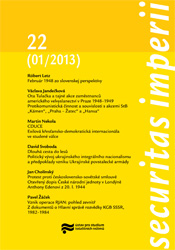Február 1948 zo slovenskej perspektívy
February 1948 from the Slovak perspective
Author(s): Róbert LetzSubject(s): WW II and following years (1940 - 1949), History of Communism
Published by: Ústav pro studium totalitních režimů
Keywords: Czechoslovakia;1948;communist party
Summary/Abstract: The theme of the communist takeover in February 1948 in Czechoslovakia has been treated in detail. This study aims to analyze this key event from the Slovak point of view and offer new insights and interpretations. The common characteristics of the state allowed the process of Sovietization to begin, which included the establishment of the authoritarian leftist-oriented political system of the National Front, where the major positions of power were occupied by Communists. In 1945 Slovakia again became a part of Czechoslovakia. The Communist Party was counting on the 1944 uprising, the arrival of the Red Army, and worsening social conditions to create a revolutionary element in the newly revived Czechoslovak Republic. However, the 1946 parliamentary elections in Slovakia saw the Democratic Party victorious (up to 62% of the votes). By contrast, the Communist Party prevailed in the Czech part of the state (40% of the votes). The authoritarian system of the National Front, which discouraged political opposition, and misunderstandings among the other Czech parties led to a debasement of the Slovak election results, with the goal of weakening Slovak state authorities. Officially, the Communists had two political parties in the country – one under the name of Czechoslovakian and the other Slovak, but they acted in unison. In the autumn of 1947, the Communists rehearsed their takeover in Slovakia. Under their control, the state security fabricated an antigovernment Slovak conspiracy. Communist-controlled organizations (trade unions, guerrillas, peasants) took extra-parliamentary steps to force the Democratic Party to resign. This crisis in Slovakia was a dress rehearsal for the communist coup in February 1948. It points to the disunity of the other parties and their failure to stand up to Communist tactics. The events of February 1948 were only a reverberation in Slovakia. By that time non Communist members of society were already disillusioned about the possibility of standing by their own policies. Very interesting is the attitude of Slovak exiles from 1945 to February 1948. The mistake can be particularly found in the actions of President Edvard Beneš and in the active collaboration and concessions of the democratic parties towards the Communists.
Journal: Securitas imperii
- Issue Year: 2013
- Issue No: 22
- Page Range: 10-34
- Page Count: 25
- Language: Slovak

